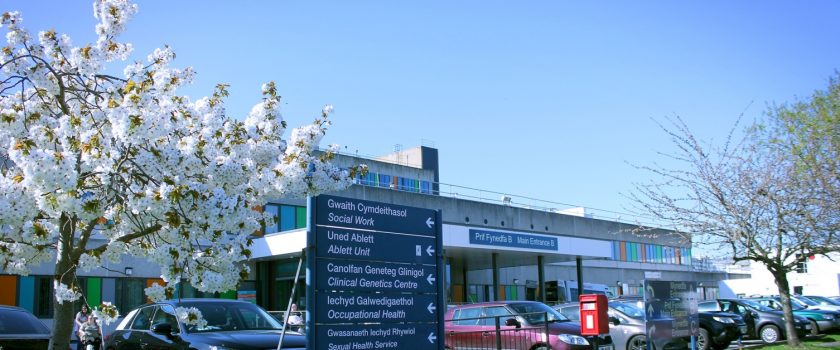“Significant disconnect between ward and board” finds ‘extremely concerning’ HIW report

A new report has identified a number ‘risks to patients’ and ‘significant concerns’ at Ysbyty Glan Clwyd’s Emergency Department.
Health Inspectorate Wales (HIW) carried out unannounced inspection of the emergency department on three consecutive days in May 2022.
This inspection was undertaken to follow up on the significant concerns HIW identified during a previous quality check undertaken in March 2022.
Inspectors found that there was a lack of improvement to an “acceptable standard” in relation to concerns identified in March 2022.
As a result, HIW designated the emergency department in Ysbyty Glan Clwyd as a Service Requiring Significant Improvement (SRSI) on 9 May 2022.
Safety and Patient Concerns
Several additional areas of concern relating to patient safety were also raised following the inspection.
The onsite inspection in May highlighted the emergency department was experiencing a period of unrelenting demand on its services. HIW noted the highly pressured environment for staff, who were working above and beyond in challenging conditions.
However, HIW found that the health board was not fully compliant with many of the Health and Care Standards, and highlighted significant areas of concern, which could present an immediate risk to the safety of patients.
This included an adult patient accommodated within the paediatric area when a child was receiving care in the same area, placing the child at risk, unlocked cupboards in the minors area, an unlabelled urine sample and super absorbent powder sachets were seen placed on the worktop within the dirty utility room and “insufficient security” in the emergency department meaning patients could “access all areas unchallenged”.
HIW also found that the quality of the nursing documentation “fell far short of the required standard” and found evidence of poor management of health and safety risks,
There were also concerns around the effectiveness of arrangements for assessing, monitoring, observing, and escalating unwell or deteriorating patients.
In reviewing the care records of 12 patients who had been triaged and were awaiting further assessment, treatment or intervention, HIW found “significant issues relating to the timely provision of medical and nursing care”.
One patient with chest pain and ECG abnormalities was placed in waiting area for five hours with no further escalation. Another who,
despite having been recorded by a doctor as possibly having had a stroke, was placed in the waiting room for over 17 hours with infrequent observations and no documented checks until 12 hours after arrival.
Infection Prevention and Control Measures
The inspectorate found that the main areas within the ED to be generally clean and tidy, with cleaning staff visible within the department throughout the course of the inspection and, on discussion, demonstrated pride in their work.
Areas and touchpoints, including toilets and door handles, were cleaned regularly and to a good standard.
However HIW found that some infection prevention and control procedures were insufficient in clinic and treatment rooms, with a number of items of equipment used for invasive treatments found to be out of date and in some cases perished.
This included some equipment which expired in 2017.
It found that treatment rooms had “visibly dirty equipment stored in cupboards”, including used tissues which were stained with red and brown fluids and thermometer probe covers stained with ear wax.
Leadership and Staff Morale
Patients were generally happy with staff interaction and the care provided. However, patients were critical of waiting times.
Concerns were also raised about staff feeling unsupported by the senior management.
HIW noted concern “that senior managers were unaware of some of the very serious issues that we found during the inspection” and that it was not “assured that there was a supportive culture in place which promoted accountability and safe patient care and that the management and leadership was sufficiently focused and robust.
The inspectorate highlighted a “significant disconnect between ‘ward and board” which it said has had “led to lack of progress in actioning the issues raised during the recent Quality Check.”
Staff were unfamiliar with some of the senior managers outside of the emergency department and were unclear as to the roles and responsibilities of some members of the senior management team.
Members of staff were also not fully consulted before changes were implemented within the department.
HIW said this had “resulted in the impact of change on clinical aspects of the service not being taken into consideration and staff feeling detached from the decision-making process.”
As a consequence, HIW was not assured that the processes and systems in place were sufficient to ensure that patients consistently received an acceptable standard of timely, safe and effective care.
The inspectorate has now has urged the health board to carefully consider all findings from this review and undertake action to reduce the potential for significant harm to patients and to embed all improvements into practice.
Some of the findings have already been addressed, with recommendations from HIW on how the health board can continue to address those outstanding.
HIW and Health Board Comments
Chief Executive of HIW, Alun Jones said: ‘The findings within this report are extremely concerning, and we have urged the health board to take immediate action to protect patients from the risks identified.
“The designation has been made to strengthen and accelerate the measures taken to drive timely improvements within the service.
“We will be working with the health board to ensure robust improvements are made in a timely manner, and will consider the timing of any follow up activity, which will need to be evidenced.’
Responding to today’s report, Jo Whitehead, Chief Executive of Betsi Cadwaladr University Health Board said: “As I said after publication of HIW’s remote quality check, this latest report shows some patients have received a standard of care well below what they, and we, expect.
“I apologise unreservedly to those patients who didn’t receive the care they deserve.
“It is most disappointing to see areas highlighted by the remote quality check had not all been addressed by the time of the unannounced inspection, some two months later.
“I have made several visits to speak with our hard working staff in the department, to discuss how we can better support them to do their jobs more effectively, as we all have a shared responsibility to get this right.
“Clinical staff have been under immense pressure and often understaffed. Our improvement approach seeks to enable staff to be open about the pressures they are under and the things preventing them from giving the care we all want to provide and for us all to provide the support required to put things right.
“Managers and leaders, alongside all those on the front line, have a responsibility to escalate issues quickly and effectively in the interests of patients.
“We have been working hard since the initial remote quality check to put systems in place which help our Emergency Department function in a smarter, more proactive way.
“A new computerised patient tracking system, support for the Emergency Department from acute clinicians of all specialties, the opening of the refurbished Ward 10 and a planned ambulance reception centre will help us to drive the change which is needed, and we continue to make more improvements.
“For example, the SDEC will be open for seven days. All of this has meant on average, waiting times for clinical triage is showing signs of improvement.
“Staffing continues to be an issue but we are committed to recruiting the permanent staff we need to ensure patients get the best possible emergency care, which is what happens in the vast majority of cases and of course, I sincerely thank staff for their continued hard work.”
Spotted something? Got a story? Email [email protected]












